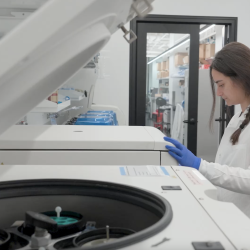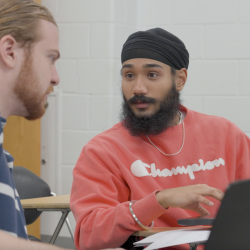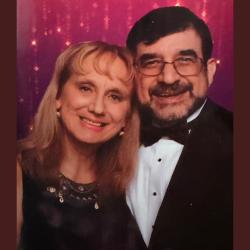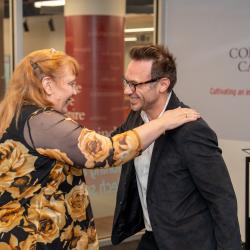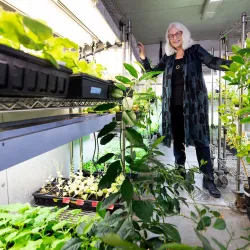Robert Menzer Establishes Award to Honor Grandson
Decades before the popularity of organic farming and the promotion of organic fruits and vegetables in restaurants and grocery stores, Robert E. Menzer, M.S. ’62, entomology, was studying the effects of pesticides on fruits and vegetables at the university. While a sophomore and president of the science club at Northwestern High School in Hyattsville, Md., Menzer connected with Entomology Professor Louis Dittman and spent his high school summers working at the university’s Plant Research Farm in Fairland, Md., just seven miles outside of College Park.
“Pesticide toxicology was a wide open field for a young biologist,” recalls Menzer. Even while pursuing his undergraduate degree at The University of Pennsylvania, he continued to work on the farm. “I helped to establish the pesticide residue analysis lab and conduct the studies to establish the proper guidelines for crop treatments,” says Menzer, who ran the lab for two years while he pursued his master’s at Maryland. Following doctoral studies at the University of Wisconsin in pesticide toxicology, he returned to the university in 1965 to run the Department of Entomology’s Toxicology Lab.
“Pesticides that contained phosphorus were in rapid development at the time,” explains Menzer. “Some pesticides were being used prematurely with little known about their behavior in the environment. We studied how specific chemicals degraded in plant and animal systems.” Menzer’s work led to restrictions on certain chemicals and has been used by the U.S. Environmental Protection Agency (EPA) in developing regulations on chemicals used in pesticides. Menzer also has served on the Safe Water Drinking Committee and the Toxicology Committee of the National Research Council formulating national standards for safe drinking water.
Menzer is the founding director of the university’s Marine Estuarine Environmental Science (MEES) graduate program. Created in 1978, it has grown into the University System of Maryland’s largest graduate program in the environmental sciences. The program was groundbreaking in its interdisciplinary, multi-campus approach and its use of distance learning technology, according to Menzer.
His love of the program led him and his wife, Sara Lee Menzer, to create the Reid Evans Menzer Memorial Graduate Award with a $100,000 gift in honor of their grandson, who was just 14 years old when he died tragically as a result of a skateboard accident. “Reid was a very intelligent child, an inventor. At age ten, he asked for and received a microscope for Christmas and enjoyed studying and photographing nature.” The award is made annually to any MEES graduate student with superior academic merit and achievement.
In 1989, Menzer was named director of the EPA’s Gulf Breeze Environmental Research Laboratory in Florida, one of the nation’s most highly regarded labs in estuarine chemical toxicology, to explore pollution problems in estuarine systems. Later, when the EPA reorganized its Office of Research and Development at its National Center for Environmental Research, Menzer was named a senior science advisor, where he helped to initiate the Science to Achieve Results (STAR) program and created joint programs with other federal agencies.
Last year, Menzer made another generous donation of nearly $100,000 to support the construction of new offices and digital classrooms for the MEES program, which moved from Cole Field House to H.J. Patterson Hall in summer 2012. The new, large classrooms are equipped with state-of-the-art electronics to transmit and receive lectures throughout the state. These capabilities will allow the MEES program to offer more courses over the interactive video network to increasing numbers of students and improve the quality of the lectures. The new space will be dedicated on May 16 in recognition of Menzer’s leadership and generosity to the university.
Today, Menzer still visits the university when he travels to the area as a consultant for the Hazardous Substances Data Bank Science Review Panel of the National Institutes of Health. Most of his time is spent enjoying the view from his Florida home, which sits on a bluff overlooking Pensacola Bay. An avid gardener, he says, “I use pesticides when needed, but sparingly. We are just happy to have flowers in the garden all year round.”



